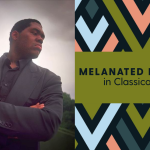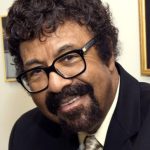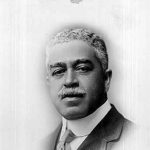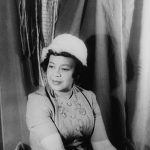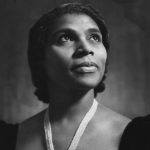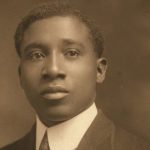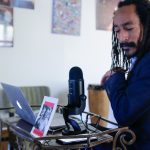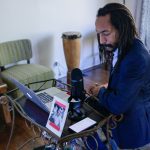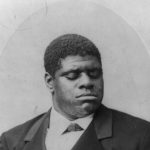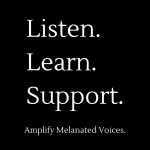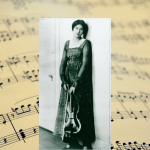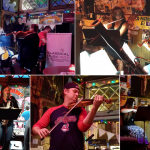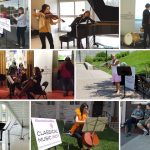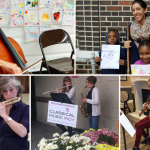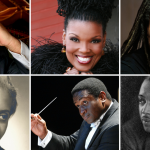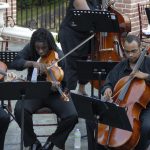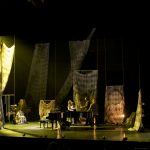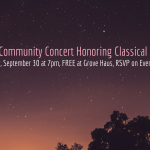MMCM S4E8: Icon of Instagram: Drew Forde is ThatViolaKid
Season Four culminates with violist, entrepreneur, and podcaster Drew Forde, known to over 100,000 Instagram followers as ThatViolaKid. Angela and Joshua spend time with Forde, who shares remarkable insights into the power of classical music. He explains how the viola serves as a window into his soul and shapes his trajectory within the classical genre and outside of it by collaborating with mainstream artists Alicia Keys, Adele, and others. Through it all, Drew Forde is a champion for artistic entrepreneurship and demonstrates the level of dedication and passion required to carry this versatile art form well into the 21st century.
Featured Music:
“Bach Cello Suite No. 2 (prelude),” arranged for viola
“If I Ain’t Got You,” by Alicia Keys, arranged for viola by Drew Forde
“Sunflower,” by Post Malone, arranged by Vitamin String Quartet, featuring Drew Forde
Angela Brown (00:00): Before we get started with this episode, we wanted to thank our listeners for your amazing support of this podcast. We can’t wait to bring you future episodes, but we need your support. Just go to givebutter.com/melanatedmoments to help share more stories of exceptional Black artists with thousands of listeners across the US and around the world. Joshua Thompson (00:27): And if you’d like more information on each episode, go to our website or follow us on social media. Angela Brown (00:33): Follow my foundation on Facebook @MorningBrown or on the web at morningbrown.org. Joshua Thompson (00:41): And follow me, Joshua Thompson, on Instagram @SockJoplin. Music Plays (00:44): [MMCM Theme] Joshua Thompson (01:00): Hello, everyone. And welcome back to another enthusiastic and exciting episode of Melanated Moments and Classical Music. I’m your co-host, Joshua Thompson. Angela Brown (01:10): And I’m Angela Brown. Joshua… Joshua Thompson (01:13): [Laughter] Angela Brown (01:13): Honey [laughter] I don’t know about you, but this season has been so much fun exploring the melanated artistry in classical music. Joshua Thompson (01:24): Indeed it has. And you know what I’m really loving about this season so far is how we just so happen to have a few special guests who are actively representing the brilliance and resurgence of the next generation and classical music in general, but with an emphasis on diasporic contributions specifically. Angela Brown (01:43): What did you just say? Unison (01:45): [Laughter] Angela Brown (01:48): Yes. Melanin is alive and well in classical music. And we’ve got another example for our listening audience for this episode. Joshua Thompson (01:57): Well, thanks to you, we do! Imma take the lead a little bit on today’s episode, but you are the one who came with the assist a few days ago for this dope, special guest interview. Angela Brown (02:07): Me and my agent, Janet Jarriel. There’s a common link between all of us, but we’ll get to that later. What diasporic dopeness do you have for us today, Mr. Joshua? Joshua Thompson (02:19): [Laughter] Well, today we are honored to have artist, entrepreneur, violit, Instagram sensation, and you know, like the Neil deGrasse Tyson of classical music… Angela Brown (02:30): Alright now! Joshua Thompson (02:31): Name is Drew Forde, but he’s more commonly known as- Unison (02:35): ThatViolaKid! Joshua Thompson (02:35): Yeah, that’s the one. That’s the one Angela, listen, this guy is dope as all get out and I am so excited. Chop it up with this young brother who is out here killing the game. So my man, the viola kid! Drew Forde, welcome to Melanated Moments in Classical Music! Angela Brown (02:53): Hey, Mr. Drew! Drew Forde (02:55): Hey, what’s up y’all, thanks so much for having me, Angela and Joshua, you guys are really- I love the vibe. I love the energy. I feel like this is gonna be a fun time. Angela Brown (03:04): Oh, we’re gonna have a good time. I just wanna bring in a couple of little memories. I think I actually spoke to you, uh, while you were still a student at Mercer University… Drew Forde(03:16): Mhmm. Angela Brown (03:17): When Janet was your teacher. Drew Forde(03:19): Yes, indeed. Yes, indeed. Can Angela Brown (03:20): Can you tell us about- what, what was that class that I was speaking? Drew Forde (03:23): That was the, uh, that was her class she teaches. It’s like the music business class. Angela Brown (03:28): Yes. Drew Forde (03:29): I was a part of the, uh, the McDuffie Center for Strings, so our McDuffie Center for Strings at Mercer University. And it’s a conservatory that is pretty unique in that it requires that everybody take public speaking, business, uh, entrepreneur classes, in addition to like the regular liberal arts curriculum and the conservatory curriculum. So, every semester I went there was like full max, 18 hours. Some classes had zero hours. [Laughter] Just so I didn’t have to overpay. [Laughter] Joshua Thompson (04:06): That’s such a cool course and study it’s, it’s comprehensive, right? There’s the notes on the page, but then there’s the entire world and crafting of a person, a personage, your verbiage, like that’s just… Man, I wish more institutions were, were doing that. So Bravo, Mercer. Bravo, Janet [laughter] right? Angela Brown (04:22): Yeah. Yeah. A blessing to have them all. But uh, Mr. Forde, can you tell us about yourself, how you got started in music and how you became an instant Instagram celebrity? Drew Forde (04:36): Well, thank you so much. I, I don’t even know if, uh, I even classify myself as, as like a, a celebrity, but I- Joshua Thompson (04:44): Okay well, we do, we do, so that’s it. Unison (04:47): [Laughter] Drew Forde (04:47): Well, I appreciate that. What I will, what I will definitely say is that there is so much advantage to being an early adopter in new spaces, especially when you feel in your gut that something is going to be the future. Angela Brown (04:59): Okay. Drew Forde (04:59): And so, I think that’s like an essential element of entrepreneurship is noticing where are we gonna be next. Not where we are right now. But, uh, where I kind of began was in Peachtree City, Georgia. That’s where I grew up. I was born in Atlanta. My parents moved down to Peachtree City when I was about one and a half and I spent my entire life until college there. Uh, I have always loved music when I was, you know, a baby. Mom would play Bach for me in the crib to make me go to sleep. Angela Brown (05:33): Mhmm. Drew Forde (05:33): And, uh, even to this day, uh, if there’s a Bach in a concert, you know, I’d be dozing. Mozart, too. It’s Pavlonian at this point. Unison (05:39): [Laughter] Angela Brown (05:44): Hey, you know, those Pavlovian dogs… Drew Forde (05:45): Sometimes when I’m playing it, I’m like, uh oh… Joshua Thompson (05:46): That’s exactly it! Unison (05:48): [Laughter] Drew Forde (05:51): I’m like “What you do to me, mom?!” But, uh- Joshua Thompson (05:53): Some people take melatonin, some people do tryptophan, you, you, you- Drew Forde (05:57): I be that, I, I be that Bach, you know what I’m saying? The old casual Bach, especially. But what happened beyond that was, uh, you know, there was always music being played in the household. My father and my mother both love, you know, Kool & The Gang… Angela Brown (06:11): Mhmm! Drew Forde (06:11): You know, Commodores. Angela Brown (06:14): Ohh, you talkin’ my stuff! Drew Forde (06:17): The Withers, you know, just like old school, like jazz, funk- Angela Brown (06:22): Yes! Drew Forde (06:23): Disco… Angela Brown (06:24): I’m old enough to be your mama. Drew Forde (06:25): [Laughter] Joshua Thompson (06:29): Drew, you’re you’re what, you’re just 30? Or just- Drew Forde (06:31): I’m 30. I’m 30. Joshua Thompson (06:32): Yeah. 30, old soul, old soul. Angela Brown (06:34): Oh yeah. I’m definitely old enough to be your mama ’cause all of that was played in my house as well. Drew Forde (06:39): Word? Oh yeah. Angela Brown (06:40): Oh yeah. Honey. Oh yeah. So, now, before we get any further, we do want to play some of your music. So could you set up this piece that we’re going to hear? As long as you don’t get drowsy. Unison (06:53): [Laughter] Joshua Thompson (06:54): No promises, though. Drew Forde (06:57): [Snore imitation] Just thinking about it. Okay. So this next piece is the first like real Bach Cello Suite that I performed and worked on to get into college. It is Bach Cello Suite No. 2, The Prelude. And it’s special to me because over the pandemic when there was no work. And when I was watching so much like societal awakening to the plight of African Americans and the, you know, George Floyd and Ahmaud Arbery, this is the piece that kept me kind of sane and all of that. So I wanted to share, this is like my definitive recording after about a year of working on it. Angela Brown (07:49): All right, let’s hear it. Music Plays (07:50): [“Bach Cello Suite No. 2 (prelude)” arranged for viola, performed by Drew Forde] Angela Brown (11:39): Oh my goodness. Joshua Thompson (11:40): That was gorgeous. Oh my, that was gorgeous. You know, I have to be honest. I, I have never been like, oh, gotta run me that Bach. But you know, Drew, as you were explaining the significance of this piece for you over the few years, it was just even more poignant and you can really hear all of yourself in this. Your, your highs, your lows, your frustrations. I mean this- Angela Brown (12:04): The clashy notes. Joshua Thompson (12:05): Yeah. So personal. I love it. You know, Drew, I was reading through, I, like I said earlier, I have been Instagram stalking you and I have scoured everything to, to figure about you, you, you do so much. You’ve given, you know, guest lectures and conferences, uh, at Juilliard, at MIT, at Harvard, at Berkeley and, and Carnegie Hall, everywhere. But you are so much more than just a performer. If I understand correctly, you’re into podcasting, you’re doing a lot of genre bending type of productions with other artists. What was that trajectory or what was that thing that made you click to say this career is gonna be more than just classical music? It’s that, but it’s something else, you know. Drew Forde(12:48): I think it’s just more of like my personal ADD. Unison (12:53): [Laughter] Drew Forde (12:56): And I’ve never been diagnosed. This is more of a joke, but I, I- you know, the, the prospect of just playing classical music for the rest of my days seems limiting. And I think that as a multifaceted human being, I need to express myself in other ways. And I loved seeing my teachers at the McDuffie Center for Strings, you know, they would perform chamber music, they would perform solo music, they would play with orchestras, they would do this, they would do that. I love the portfolio of different activities that have to music instead of just like the, the subscribed path of sitting in the back of a viola section for 47 years and dying on stage. Unison (13:44): [Laughter] Drew Forde (13:45): Which did, which did happen. Angela Brown (13:47): That did happen, yeah. Drew Forde (13:48): It did happen in Atlanta. Angela Brown (13:50): So tell me, because I tell a lot, I, I, I really like what you said about… Basically boiling down what you said. You have to have many streams of income. You have to have many, many colors to paint with. You have to, to, to have a melange of different vegetables to make a good stew, and you are willing to throw it all at the wall and see what sticks. Can you tell me how you came to start doing some cover music of some popular artists? Drew Forde (14:24): That was like the immediate desire. You, you know, like the internet… We’re still trying to decide as a, like a human race, whether or not the internet was a mistake. Angela Brown (14:35): [Laughter] Joshua Thompson (14:36): Mhmm. Pick a day, I feel some kind of way. Drew Forde (14:41): [Laughter] It’s a coin flip on any given day. But I, I think it was in the ultimate blessing in that, you know, it, it allows the whole breadth of knowledge and experience, you know, to be easily accessible. And so like when the internet came out and I was able to go on AOL, I started going on YouTube. I started like looking for what other musicians were doing and um, I, as a, as a kid, I was an avid video gamer. I loved movies. So the, the first thing I did when I was in fifth grade, this is even before I picked up the viola, as soon as I knew how to read music, I wanted to play the Harry Potter theme. Like that was exactly what I was trying to do on the bells. And I could only get the first couple measures, but that made me feel so happy that I could play something that I recognized and that, that other people recognized too. So the idea of making cover music was just essentially me connecting to what people listen to on a day to day basis, and then playing it for them. And especially with a string instrument, in a way that they don’t expect it to appear. That’s sort of like, I don’t know, cognitive dissonance was what was really fascinating to me. And so I started really diving deep into doing that. Angela Brown (16:01): Okay. Joshua Thompson (16:01): And I like that. Right. ‘Cause a lot of people kind of bag on like cover bands, but you, you highlight there is an inherent utility in it. People want it, whether they know it or not, it also sounds like it started as a personal, you do it because it’s your gift and you get to choose how you want to use it for yourself or for others. Right? Drew Forde (16:19): Mhmm, mhmm. Joshua Thompson (16:20): And that’s really important. Uh, I know you’ve got one queued up on deck. It is one, I think many of our listeners will absolutely recognize. Um, and I saved this one and I didn’t listen to cause I wanted to be surprised. So you got a little something going on with Alicia Keys, am I correct? Drew Forde (16:33): Yes, indeed. Joshua Thompson (16:34): Okay. Drew Forde(16:35): Um, I was really inspired when I had the opportunity to perform with her, uh, for the American Music Awards back in 2019. Joshua Thompson (16:40): Oh wow. Drew Forde (16:42): And she’s, she’s uh, she was one of the few, you know, A-list stars that I’ve worked with that actually comes and says hi to you, shakes your hand, looks you in the eye and thanks you for being there. And that really meant a lot. And so, you know, growing up, listening to her music and just seeing her in the flesh and getting to work with her, I was like, I need to kind of cement this feeling that I have. Um, and that’s what this cover was all about. Angela Brown (17:11): Well, let’s listen to a little bit of “If I Ain’t Got You” from Drew Forde and Alicia Keys. Music Plays (17:17): [“If I Ain’t Got You” by Alicia Keys, arranged for viola and performed by Drew Forde] Angela Brown (20:50): Yes, baby. Joshua Thompson (20:54): Yes. Yes. I’m over here singing off key. Yes. Angela Brown (20:57): Yes, I’m over, I’m singin’. Oh yeah, honey. I was all in it. Joshua Thompson (21:02): Uh-huh, you and me both. Yep. [Laughter] Angela Brown (21:04): Because you, you were actually playing with yourself. You, you did a backing track and then you played on top of that. Correct? Drew Forde (21:11): Mhmm I, I created the whole arrangement. Everything in there was viola. Joshua Thompson (21:14): It’s a beautiful arrangement. It’s um, it is… Imma have to run it back. That’s how it was. It was good. I love it. Angela Brown (21:21): We gon’ have to play that again, honey.We gon’ have to put that on wrap, yes! Joshua Thompson (21:24): Yes ma’am. [Laughter] Angela Brown (21:26): Now, you know, I was looking through some additional notes on you in research and one thing that you said that I loved that you said was that it’s the intimacy, it’s the rawness, it’s the humanity. That’s what’s most important and keeps me waking up every single day, playing my instrument. And I think that’s important for any young person out there listening to this podcast to know. It’s gotta be about the passion first before it can be about anything else. And I definitely hear this in every piece from Bach to Alicia Keys that you have played thus far. Drew Forde (22:10): Thank you. Angela Brown (22:11): Yeah. It’s it’s wonderful. And I also see that you have also worked with Laura Karman and she, and I did something together, the Grammy award-winning, uh, CD “Ask Your Mama” and you were on Lovecraft Country. Drew Forde (22:27): Yes. Angela Brown (22:27): So it’s just… It’s so exciting to me to be able to converge all these different artists that I have worked with that come on this podcast. And I understand you have a podcast. Can you tell us a little bit about yours? Drew Forde (22:44): Yes. Thank you so much for, for giving me the space to, to speak a little bit about. It is called “Faking Notes Podcast.” And the, the reason why we call it that is because, you know, there’s this, there’s this perception in classical music. That one must be complete before one can participate. Angela Brown (23:05): Mhmm. New Speaker (23:05): Yeah. Drew Forde (23:06): But in, at the core of everything, especially the- undergoing a 21st-century artist entrepreneur journey, you need to fake it. You need to fake it to make mistakes. You need to fake it to like test things. You need to have the humility to keep getting up when you fall down and that’s why we call it “Faking Note Podcasts” ’cause at the end of the day, everybody’s faking it. And uh- Angela Brown (23:30): Baby, you ain’t said nothing but a word. Joshua Thompson (23:32): [Laughter] Say, do you feel ’em you feel? You know, and it’s, you’ve had several, several episodes. I think I alluded to it a little bit earlier. The podcast is really a wonderful mirror and reflection of you and your life and your career. Yes, the music is front and center most often, but you’re touching on some of those other things you learned in your undergraduate experience between business, between understanding scales of economy. And I believe you do a lot of stuff with like a like cryptocurrency. Do you, while we’ve got the time, can we hear just a short snippet of one of your podcast episode? Drew Forde (24:05): Yes. This one is just mostly, it kind of talks about, uh, the act of practicing. But I think this little analogy that I share here can be applied to building a career, building up an investment portfolio, uh, all of the above. And I think it could be, it’s a really fun illustration that I came up with on the spot. Joshua Thompson (24:27): Wonderful. Drew Forde (24:29): I think the life balance is, is super huge. Um, you don’t wanna burn out, it’s it’s a marathon. Always remember that, it’s a marathon. And one thing that is just underestimated is just like the value of time… Time is like this wonderful thing that is a multiplier on your progression as a human. Like if you really just have the patience to plant the seed and just water it whenever it needs it. If you’re planting the seed of becoming a professional musician, as an instrumentalist, you plant seed by choosing an instrument. Now you have to water that plant every day, just a little bit, you know? And, and, and over time, you know, that that little seed will grow into a plant. You could stop and eat the leaves of that plant and, and call it a day. Or you could maybe have a little bit of patience, continue to water it, savor it for a little bit later. The plant grows into a tree and you could chop the tree down. You could, you could make paper from it. You know, you could, you could like do whatever you want with that, with that lumber. Or you could have a little bit more patience, continue to water it and then wait ’til it bears fruit. And then, you know, you could take that fruit, you could eat it, call it a day or you can eat some of the fruit, take some of the other fruit, take those seeds and go plant another tree. Right? And start the process over again. Like it just depends on like what you want. And so having that perspective of time in the macro and going backwards, uh, will really help guide you into what you should be doing today. Angela Brown (26:22): Baby boy, you are wise. Joshua Thompson (26:25): I was gonna say, yes, he is. Angela Brown (26:27): And your mama and daddy did a good job. Drew Forde (26:31): [Laughter] Thank you. Angela Brown (26:32): I tell students all the time, it takes nothing to be nice. And I can truly say, you’re a nice man. And I have enjoyed this podcast and the wisdom that has fallen from your little tiny young lips. Unison (26:48): [Laughter] Joshua Thompson (26:49): See Drew, this is why she Auntie Angela to all of us and so many. You know, a couple things before we kind of wrap this up just a little bit, there is another piece that we want to hear, but for that you’re in such demand like you’re, you’re in a- you’re based in LA currently. Correct? Drew Forde (27:08): Mhmm, yes indeed. Joshua Thompson (27:09): Okay, so a little bit of a time difference. We woke you up early this morning, so we could have you here and we say, thank you. You’re, you’re super booked. I mean, you’ve got so much going on. From what you’re able to share, what are some of the current projects that you have coming up or tours that you’re doing and how do we follow you and, and get to know all things that is ThatViolaKid? Drew Forde (27:30): Well, you can find me on the internet @ThatViolaKid, pretty much everywhere except TikTok and Snapchat, on those platforms, I’m @OhSnapItsTVK. Joshua Thompson (27:40): Ah, I like that. Drew Forde (27:40): Those Gen-Zers… They, they snapped it up me. But essentially what’s going on right now is I’m I’m working on this podcast, uh, personally for what, uh, Faking Notes Podcast. But what I’m working on as an individual is, uh, I’m working on a sample pack. Uh, I’m calling it Opus One right now, it may retain that name, but it’s gonna be viola samples for producers. I’m also, I literally just got off the phone with, uh, a friend of mine yesterday. We’re gonna be creating a, an NFT project. That’s gonna utilize, uh, a certain classical public domain composer, and we’re gonna combine art and the sound, and we’re gonna sell that as a highendNFT that can be used for education and just like a really cool entry point into classical music. And then finally, I’m, I’m getting together with my friend DSharp, who is a, uh, wonderful violinist and content creator. Uh, who’s a brother, and we’re- we’ve thought, okay, so why is Black History Month the shortest month of the year? And why are all these white people, – sorry, white people listening – Why do they think that white history is the only history of America and when actually American history is Black history. So I was like, yo, what if every month was Black History Month? Joshua Thompson (29:02): Yes. Drew Forde (29:02): And we were like, okay, bet. Let’s start talking about some players from the past, some Black string players from the past that are killing that nobody even knows. And let’s, let’s bring ’em into the 21st-century. So we’re gonna be working on a project, uh, for YouTube, uh, of that nature as well. So I got a little bit stewing and that has nothing to do with like the concert I’m doing. I’m playing with, uh, Candlelight Concerts out here in San Diego. Um, and, uh, yeah, it’s, it’s still kind of rolling in, doing weddings and things like that. So we out giggin’. Joshua Thompson (29:38): I love it. Angela Brown (29:39): Yay. Joshua Thompson (29:39): Work on, work on one more piece that we want to hear. This is, is this, uh, a, a string quartet? What’s the, the piece that you have for this one? Drew Forde (29:47): Yeah. So this is a, a, another cover it’s, uh, a Post Malone cover his, uh, hit song Sunflower. And this was a collaboration between the Vitamin String Quartet and myself. And, uh, it was, was a real watershed moment. I grew up listening to the, uh, uh, the Vitamin String Quartet because they’re known for taking pop music and arranging it for a classical string quartet: two violins, a violist, and a cellist. And, uh, I got to collaborate them with them as a soloist on this. And so this was really fun, fun, really fun project. Joshua Thompson (30:20): Alright, let’s take, listen. Music Plays (30:21): [“Sunflower” by Post Malone, arranged by Vitamin String Quartet, featuring Drew Forde] Angela Brown (33:04): I am over here smiling from ear to ear. I tell you, I have loved every minute of this episode. you know, Mr. Fordeor Drew baby, you truly are ThatViolaKid and you are absolutely blazing a trail of entrepreneurship, artistry and commitment to being your authentic self. I appreciate you. And I know your mama and daddy are so proud of you and I ain’t mad at nobody for loving you, honey. Joshua Thompson (33:35): [Laughter] Angela Brown (33:35): Thank you for joining us today. Drew Forde(33:37): Thank you for having me. This has been a pleasure. Joshua Thompson (33:39): Hey man, we’re we’re big fans and so to everyone listening the land of podcast and on social media, check this brother out. So, Mr. Forde, thank you because I know between me and Auntie Angela, you have certainly gained another follower in cyberspace and in real life, I promise you have. So- Drew Forde (33:57): I appreciate you. Joshua Thompson (33:58): Of course. With that, uh, on a note of encouragement, inspiration, and sage words from someone wise behind his years, I’m Joshua Thompson. Angela Brown (34:09): And I’m Angela Brown. Unison (34:13): And this has been Melanated Moments in Classical Music. Angela Brown (34:23): Melanated Moments in Classical Music is a production of Classical Music Indy. Our producers are Ezra Bakker Trupiano and Adam Fonacier. Our theme music was composed by Laura Karpman. Joshua Thompson (34:38): Melanated Moments in Classical Music is made possible in part by the Indiana Arts Commission, a state agency, and the National Endowment for the Arts, a federal agency. Additional support comes from the Indy Arts Council and the City of Indianapolis. Angela Brown (34:53): Our podcast partners are Morning Brown, Inc. and Symphony Tacoma.
[/su_tab] [su_tab title=”Related Blog Posts” disabled=”no” anchor=”” url=”” target=”blank” class=””]LOCAL CLASSICAL – MELANATED MOMENTS SEASON SIX
As we continue celebrating Black Music Month, this week’s playlist will feature music and artists discussed during the latest season of Melanated Moments in Classical Music. All of season six was recently released and featured vibrant discussions about artists such as Scott Joplin, Hazel Scott, Joseph Bologne, and Kenneth Overton, among others.
NEW CLASSICAL – JESSICA MEYER
In this week’s playlist, we feature GRAMMY-nominated violist and composer, Jessica Meyer. Meyer’s first composer/performer portrait album in 2019 debuted at #1 on the Billboard traditional classical chart, where “knife-edge anticipation opens on to unexpected, often ecstatic musical realms, always with a personal touch and imaginatively written for the instruments” (Gramophone Magazine). We’ll hear performances by Jessica Meyer as well as her compositions from her first album, Ring Out, throughout this playlist.
Practice makes Prayer: A Divine Dialogue with Derek Reeves
Practice makes Prayer: A Divin …
LOCAL CLASSICAL – BLACK MUSIC MONTH
In this week’s playlist, we celebrate Black Music Month which takes place in June. It was created by President Jimmy Carter in 1979 to honor and celebrate Black artists’ contributions to music. We’ll be honoring the late Herman Whitfield III, an Indianapolis native who was a gifted pianist and composer. We’ll also hear performances of artists who have been featured in season four of Classical Music Indy’s podcast, Melanated Moments in Classical Music.
LOCAL CLASSICAL – MELANATED MOMENTS
In this week’s Black History Month playlist, we bring you recordings by composers, performers, and artists who have been highlighted in our podcast, Melanated Moments in Classical Music. Melanated Moments is the ward-winning podcast from Classical Music Indy that shines a spotlight on musical works composed by, for, and about Black people.
LOCAL CLASSICAL – HOST OKARA IMANI
Hey, Starshine! This is Okara Imani, Media Production Fellow for Classical Music Indy, and your guide to The “I” in Classical Music. I’m here to highlight the cultural and social intersections of the classical art form, beyond the Classical Period and beyond the constructs of Euro-centric high society origins.
Ric’key Pageot: Inspiring a Moment to Learn, Acknowledge, and Respect
Ric’key Pageot: Inspiring a Mo …
Ignatius Sancho: Composing the Hypocrisy of Colonialism & Convention
Ignatius Sancho: Composing the …
NEW CLASSICAL – DR. BILL BANFIELD
This week we bring you the music of Dr. Bill Banfield. Dr. Banfield is an award-winning composer whose symphonies, operas, chamber works have been performed and recorded by major symphonies across the country. Few have a wider, performed professional composing output, that has had public concert performances, reviews, radio, recordings of some 12 symphonies, 7 opera, 9 concerti, chamber, jazz, and popular forms. This alone making Dr. Banfield one of the most performed, recorded composers of his generation. In 2010 and 2016, Dr. Banfield served as a Pulitzer Prize judge in American music.
#AmplifyMelanatedVoices
Classical Music Indy stands with our Black community. We are here to listen, learn, and lend our support. We believe that classical music is powerful; that it evokes a range of human emotions and creative expression.
Angela Brown Brings her Unbridled Zeal to a New Podcast.
Angela Brown brings her unbrid …
Local Classical – Angela Brown
We continue our Black History Month programming this week with our featured artist, soprano Angela Brown. Born in Indianapolis, Brown has led a world-renowned career as a vocal soloist. Her highly successful Metropolitan Opera debut in the title role of Aida captured instant attention from international print and broadcast media and catapulted Angela onto the world’s prestigious opera and symphonic stages.
Rebecca Clarke: Viola Master and Composer
Rebecca Clarke is a name many violists know. She was an internationally acclaimed soloist, chamber musician, and composer during post-Victorian Era England. Despite a controlling and abusive father, she was able to leave her mark on the world with her musical achievements.
#RandomActsofMusic: Taking Music to the Streets
Over the past year, Classical Music Indy provided 45 spontaneous concerts with our #RandomActsofMusic, serving 7,428 people. Learn more about these pop-up concerts that beautify Indy!
Highlighting our Female Performers
Classical Music Indy employs a diverse range of musicians for our events around Indianapolis. In 2016 we hired 95 musicians. Classical Music Indy has dedicated our blog articles to outstanding women musicians this month. We’ve shared about great women music educators in America and about under-recognized women musicians throughout history. This week, we take a look at a few of Classical Music Indy’s top performers – women who are doing great work here and now in the city of Indianapolis. Read below about these incredibly talented musicians, and hopefully you’ll hear them at one of our events in the near future!
The Metropolitan Youth Orchestra: More than Music
How can music help a child in need? The Metropolitan Youth Orchestra is a family and youth development program of the Indianapolis Symphony Orchestra aimed at providing music education and skill-building to Indianapolis youth. Krystle Ford, Associate Director of the MYO, shares with us how using music as a medium can teach a student important life skills and provide a way for the whole family to come together.
2016: One for the Record Books
As we approach the end of this year, we take time to contemplate the successes of our organization. Classical Music Indy’s President and CEO, Molly Deuberry Craft, writes that 2016 was “a notable year.” Read below to see all that CMI has achieved this year in the name of music. Happy New Year and best wishes for 2017!
Classical Music Month in Review
In honor of Classical Music Month, Classical Music Indy stepped up our efforts to connect the community to Classical Music. We brought 27 performances to Indy – that’s nearly one performance a day! Read more about our activities in September in our blog post!
In Memory of Kevin Randolph: My Music. My Story.
On June 25, 2016, Kevin Lamont Randolph passed away. Randolph was a musician, educator, and lover of life. Kevin was involved with the Metropolitan Youth Orchestra (MYO) from its inception in 1995—first as a student, and later as the Program Coordinator. We met with Krystle Ford, Associate Director of the MYO, to learn more and share Kevin’s story.





